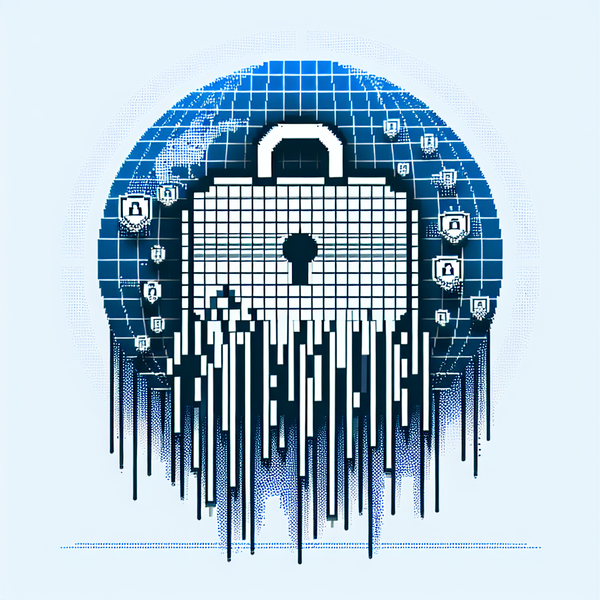Secret CISO 7/24: Healthcare Breaches, Amazon AI Exploit, Chrome Flaws, Bitcoin Threats, IBM Hijacking - A Cybersecurity Storm Unfolds

Welcome to today's edition of Secret CISO, where we unravel the intricate web of cybersecurity breaches and vulnerabilities that are shaping the digital landscape. In this issue, we delve into a series of alarming data breaches that have rocked the healthcare sector, exposing millions of patients' sensitive information. From Radiology Associates of Richmond to the AMEOS Group in Europe, these incidents highlight the urgent need for fortified security measures in healthcare networks.
Meanwhile, the world of AI and technology faces its own set of challenges. A security researcher has uncovered a critical exploit in Amazon's AI tool, raising questions about the robustness of AI systems. Additionally, the pharmaceutical industry grapples with an 83% compliance gap in AI data security, threatening valuable research investments.
As we navigate these turbulent waters, ransomware trends continue to evolve, with new affiliates complicating threat identification. High-severity vulnerabilities in Google Chrome and Honeywell's smart building middleware further underscore the necessity for vigilance and rapid response to emerging threats.
In the realm of software vulnerabilities, potential exploits in Harbor, IBM Db2 Mirror, and Bitcoin transactions reveal the persistent risks of unauthorized access and data manipulation. These findings serve as a stark reminder of the critical importance of securing our digital infrastructure against ever-evolving cyber threats.
Stay informed and stay secure with Secret CISO, your daily guide to navigating the complex world of cybersecurity.
Data Breaches
- Radiology Associates of Richmond Data Breach Affects 1.4 Million Patients: A significant data breach at Radiology Associates of Richmond has compromised the personal information of 1.4 million patients. This incident is notable for its scale and the fact that it has not been linked to any known ransomware group, raising concerns about the security measures in place. Source: DOTmed.
- 32 Pearls Data Breach Affects 23,550, Exposing Social Security Numbers: The data breach at 32 Pearls has affected 23,550 individuals, exposing sensitive information such as Social Security numbers and medical data. This breach highlights the ongoing vulnerabilities in the healthcare sector and the need for robust data protection measures. Source: Claim Depot.
- Operation Par Confirms Data Breach and Exposure of Social Security Numbers: Operation Par Inc. has confirmed a data breach that exposed personally identifiable information (PII) and protected health information (PHI) of numerous individuals. This breach underscores the critical importance of safeguarding sensitive data in healthcare organizations. Source: Claim Depot.
- Data Breach Hits Swiss Hospital Group AMEOS: The Zurich-based AMEOS Group, managing over 100 healthcare providers across Switzerland, Austria, and Germany, has suffered a major data breach. This incident raises significant concerns about the security of healthcare networks in Europe. Source: SC Media.
- Octapharma Reaches $2.55 Million Settlement Over Data Breach: Octapharma Plasma Inc. has agreed to a $2.55 million settlement following a data breach that compromised Social Security numbers. This settlement highlights the financial repercussions of data breaches and the importance of maintaining stringent data security protocols. Source: Bloomberg Law News.
Security Research
- Hacker Exploits Amazon Q AI Tool for Data-Erasing Attacks, Exposing Risks: A security researcher has uncovered vulnerabilities in Amazon's AI ecosystem, specifically targeting the Amazon Q AI tool. The exploit allows attackers to erase data, highlighting significant security risks within AI systems. This discovery has sparked discussions on social media platforms, emphasizing the need for enhanced security measures in AI technologies. Source: WebProNews.
- AI Data Security: The 83% Compliance Gap Facing Pharmaceutical Companies: A recent study reveals a staggering 83% compliance gap in AI data security within the pharmaceutical industry. This gap poses a severe threat, as the leakage of sensitive data, such as molecule structures, could lead to significant financial losses. The report calls for urgent action to address these vulnerabilities and protect valuable research investments. Source: Clinical Leader.
- Q2 2025 Ransomware Trends Analysis: Boom and Bust: The latest analysis of ransomware trends in Q2 2025 indicates a volatile landscape, with new affiliates potentially posing as security researchers or law enforcement. This trend complicates the identification of genuine threats and underscores the need for robust verification processes. The report suggests that organizations must remain vigilant and adapt to the evolving tactics of ransomware groups. Source: SecurityBrief Australia.
- High-Severity Chrome Vulnerabilities Expose Users to Arbitrary Code Execution: Security researcher Shaheen Fazim has discovered critical vulnerabilities in Google Chrome, allowing for arbitrary code execution. These flaws, identified in July 2025, have prompted Google to issue urgent patches to protect users. The discovery highlights the ongoing need for vigilance and prompt response to security threats in widely-used software. Source: CyberPress.
- Honeywell Smart Building Middleware Vulnerable: Security researchers have identified vulnerabilities in Honeywell's smart building middleware, which could potentially be exploited to bypass security alarms. This discovery raises concerns about the security of IoT devices and the need for manufacturers to implement stronger protective measures. The findings emphasize the importance of securing critical infrastructure against cyber threats. Source: BankInfoSecurity.
API Security
- Possible ORM Leak Vulnerability in the Harbor: Administrator users on Harbor could exploit an ORM Leak vulnerability in the /api/v2.0/users endpoint to leak users' password hash and salt values. The vulnerability arises from the q URL parameter allowing filtering by any column, which can be abused to leak sensitive information. This flaw could potentially be exploited by lower privileged users to gain unauthorized access to sensitive data. Source: Vulners.
- IBM Db2 Mirror for i Cross-Site WebSocket Hijacking: IBM Db2 Mirror for i versions 7.4, 7.5, and 7.6 are vulnerable to cross-site WebSocket hijacking. An unauthenticated malicious actor could exploit this by sending a specially crafted request to sniff an existing WebSocket connection, allowing them to perform unauthorized operations. Source: Vulners.
- Digital Signature Forgery Attack on Bitcoin: A cryptographic attack known as Digital Signature Forgery Attack poses a threat to Bitcoin transactions by allowing attackers to create fake ECDSA digital signatures. This vulnerability risks unauthorized transaction authorization without the owner's private key, threatening the security of cryptocurrency wallets. Source: Vulners.
- Stack-Based Buffer Overflow in u-link Management API: An unauthenticated remote attacker can exploit a stack-based buffer overflow in the u-link Management API to gain full access to the affected system. This vulnerability poses a significant risk as it allows attackers to execute arbitrary code remotely. Source: Vulners.
- bun Vulnerable to OS Command Injection: All versions of the package bun are susceptible to OS Command Injection due to improper neutralization of user input in the $ shell API. Attackers can exploit this by providing crafted input with command-line arguments or shell metacharacters, leading to unintended command execution. Source: Vulners.
Sponsored by Wallarm API Security Solution
Final Words
As we wrap up today's edition of Secret CISO, it's clear that the digital landscape is fraught with challenges and opportunities. From the massive data breach at Radiology Associates of Richmond affecting 1.4 million patients to the vulnerabilities discovered in AI systems and IoT devices, the need for robust cybersecurity measures has never been more critical.
These stories remind us of the importance of staying informed and proactive in our approach to data protection. Whether it's the financial repercussions faced by Octapharma or the potential risks posed by vulnerabilities in widely-used software like Google Chrome, every incident underscores the necessity of vigilance and swift action.
We encourage you to share this newsletter with friends and colleagues who are passionate about cybersecurity. By spreading awareness, we can collectively work towards a safer digital environment. Let's continue to learn, adapt, and protect our digital assets together.
Thank you for being a part of the Secret CISO community. Until next time, stay secure and stay informed!




